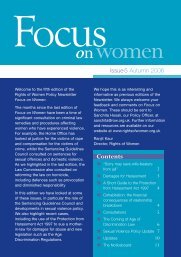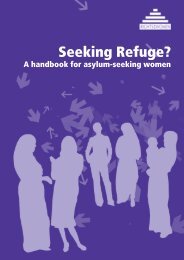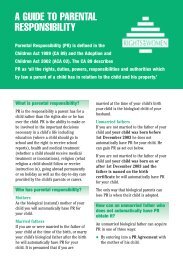DOMESTIC VIOLENCE, IMMIGRATION LAW AND - Rights of Women
DOMESTIC VIOLENCE, IMMIGRATION LAW AND - Rights of Women
DOMESTIC VIOLENCE, IMMIGRATION LAW AND - Rights of Women
Create successful ePaper yourself
Turn your PDF publications into a flip-book with our unique Google optimized e-Paper software.
You should seek immigration legal advice as soon as possible.<br />
• If you still had current leave to remain on a spouse visa when you applied for DDV, you<br />
would have a right <strong>of</strong> appeal, and you should seek advice as soon as possible.<br />
• If you applied for DDV whilst you were on some other type <strong>of</strong> visa (e.g. as a dependent<br />
on your partner’s work visa), you would have a right <strong>of</strong> appeal. But the appeal would not<br />
have any legal merit, because this application is only open to those who are on, or have<br />
had, a spouse visa. Whatever the reason for your refusal, there may be some other<br />
application you could make to the UKBA. But, by having applied for leave under the DDV<br />
concession and been refused, you would now no longer have any leave to remain unless<br />
you make an in-time appeal.<br />
• If you applied under the DDV concession at a time when you had no leave, you will have<br />
no right <strong>of</strong> appeal, and will remain liable to removal. When the UKBA eventually make a<br />
decision to remove you, you will then have a right <strong>of</strong> appeal.<br />
2. New Immigration Rules on family migration from 9 July 2012: important changes<br />
for women fleeing domestic violence but who do not fit the Domestic Violence rule,<br />
and for other women with no recourse to public funds<br />
The new Immigration Rules have introduced major changes in the requirements for all categories<br />
<strong>of</strong> family migration, and set out in detail what the UKBA believes to be reasonable requirements for<br />
an applicant to qualify for leave to remain under art 8 ECHR (an application based on the<br />
applicant’s rights to private and family life) and/or ‘best interest <strong>of</strong> the child’ as set out in the UN<br />
Convention on the <strong>Rights</strong> <strong>of</strong> the Child, brought into law in section 55 Borders, Immigration and<br />
Citizenship Act 2009 (an application to remain in the UK with a child whose best interests it is to<br />
remain in the UK).<br />
The UKBA clearly intends these new Rules to set clear limits on who will, and who will not, be<br />
granted leave to remain on the basis <strong>of</strong> family life under article 8 ECHR or the ‘best interests <strong>of</strong> the<br />
child’. In its press statement on 11 June, the UKBA said:<br />
The new Immigration Rules will also unify consideration under the rules and Article 8 <strong>of</strong> the<br />
European Convention on Human <strong>Rights</strong>, by defining the basis on which a person can enter or<br />
remain in the UK on the basis <strong>of</strong> their family or private life. (Our emphasis)<br />
However it is very important to note that the rights protected by art 8 ECHR and the UN<br />
Convention on the <strong>Rights</strong> <strong>of</strong> the Child must be considered in each individual case and in<br />
accordance with the law. This means that, despite the UKBA’s desire to introduce limitations on<br />
how art 8 ECHR or the rights <strong>of</strong> a child can be taken into account, individual applicants may still be<br />
entitled to leave to remain even if they do not meet the UKBA’s ‘requirements’ now contained<br />
in the Immigration Rules.<br />
From 9 July 2012, there will be 2 main ‘routes’ to settlement for family migrants.<br />
• The 5-year route<br />
Those family migrants who are not overstayers and whose current leave to remain permits them to<br />
switch into a family migration category, or who can make a valid entry clearance application as a<br />
spouse, partner, child, elderly dependent relative, complying with all the requirements <strong>of</strong> the new<br />
family migration Rules will be granted leave to remain in the ‘5 year route’. The new ‘eligibility’<br />
requirements include very specific and onerous requirements as to income, as well as a list <strong>of</strong><br />
‘suitability’ requirements. These are summarised below. Applicants will be given leave to remain for<br />
30 months (2 ½ years) with no recourse to public funds. They will then have to apply for a further<br />
period <strong>of</strong> 30 months’ leave. After 5 years they will be eligible to apply for indefinite leave to remain.<br />
4
















